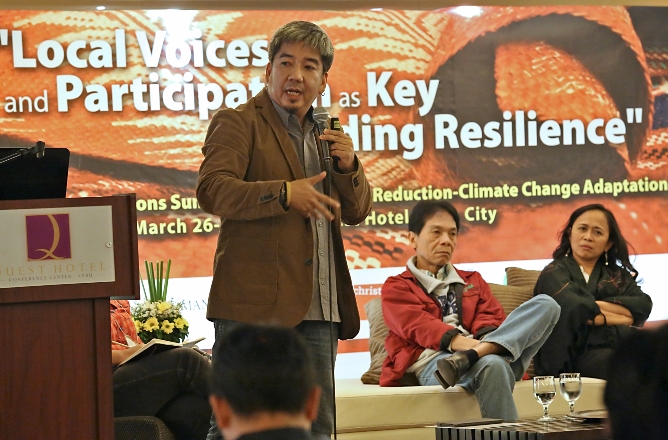Don’t blame climate change for everything

CODE RED. Renato Redentor Constantino of the Institute for Climate and Sustainable Cities makes a presentation on his group’s experiences and thoughts on accountability and transparency in financing disaster risk reduction and climate change adaptation. Also in photo are: Isagani Serrano, co-convenor of Social Watch Philippines and president of the Philippine Rural Reconstruction Movement and Lellani Galvez of the People’s Public Finance Institute. (CDN PHOTO/JUNJIE MENDOZA)
Not all calamities are caused by climate change and not all funding for climate change should be for disasters.
This is the gist of the message of climate change campaigner Renato Redentor Constantino of the Institute for Climate and Sustainable Cities, in the ongoing two-day summit of civil society organizations on disaster risk reduction and climate change adaptation which started in Cebu City yesterday
“Climate change should not be used as an excuse for government failure,” he said.
Constantino explained that extreme weather systems spawned by climate change does not create new catastrophes.
Extreme events like storm surge, flood, landslides are not new phenomenon. What climate change does, he said, is “magnify the impact and even amplify the impact of wrong development.”
While repairing the damage caused by disasters needs to be financed by government and the international community, there is a need to provide wider-ranged financing to different climate change impacts.
Constantino said there is a need to prepare for slow onset impacts of climate change.
“Sea level rise in millimeters, that may not cause flooding, can have an impact or slight temperature increases affect moisture in certain areas, but not heat waves, which may lead to a general decline in agricultural productivity. This may need climate change finance, too,” Constantino said.
He cited Republic Act 10174 or the People’s Survival Fund (PSF) Law as the potential source of climate change funding. The challenge now, he said, is for local government units to design projects that would mitigate climate change impact and decrease vulnerability of communities and access the PSF, a P1 billion trust fund appropriated annually through the General Appropriations Fund (GAA).
slow onset impact
Rapid and slow onset impact of climate change have been defined by the United Nations Framework Convention on Climate Change (UNFCCC) in Cancun, Mexico in 2010. Under the rapid onset are intensification and increased occurrence of extreme weather events like storms, droughts (El Niño) and above normal rainfall (La Niña).
Slow onset impacts are sea level rise, increasing temperatures, ocean acidification, glacial retreat, salinization, land and forest degradation, biodiversity loss and desertification.
Among the slow onset impact projects that may need funding now, according to Constantino are: irrigation projects that anticipate increase or reduction of precipitation over long periods; sea level rise and coastal erosion prevention and ocean acidification impact research.
According to 2011 Business Risk Assessment and the Management of Climate Change Impacts undertaken by the World Wildlife Fund (WWF) and the Bank of the Phil. Islands Foundation, Cebu is exposed to six climate change scenarios: the El Niño (drought); sea surface temperatures rise of 1 – 4 degrees Celsius; ocean acidification; sea level rise; more intense typhoons and above-normal rainfall that could result in floods and landslides.
Meanwhile, Isagani Serrano of Social Watch Philippines, financing DRR and CCA should be through the national budget or the GAA.
“Development plans and the budget should not only be poverty sensitive but climate change sensitized,” Serrano said.
The March 26 – 27 CSO Summit on DRR and CCA’s theme is “Local voices and participation as key to building resilience.”
Disclaimer: The comments uploaded on this site do not necessarily represent or reflect the views of management and owner of Cebudailynews. We reserve the right to exclude comments that we deem to be inconsistent with our editorial standards.




